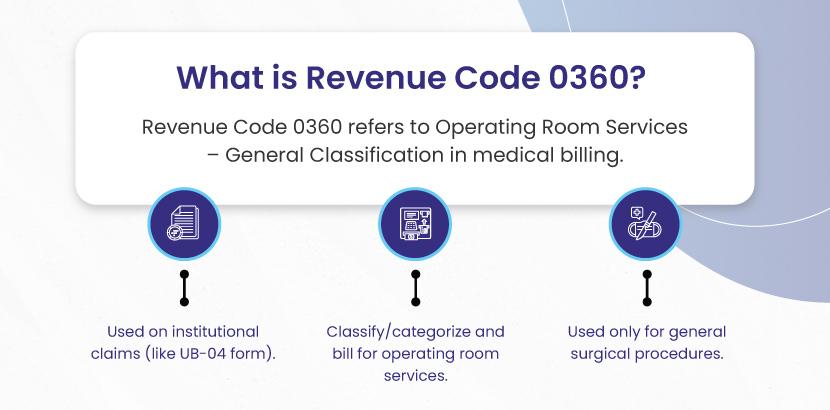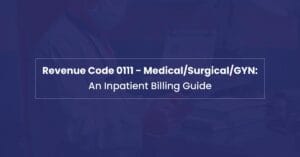When a hospital or clinic submits a claim, every service they provide to a patient must be grouped under the right revenue code. These four-digit codes tell the insurance company what service the healthcare provider delivered and how much the payer should reimburse for it. Using the correct code prevents denials, speeds up processing, and ensures the provider gets paid the right amount.
Some examples include:
- 011X to 016X: Room and board services
- 045X: Emergency room visits
- 036X: Operating room services
- 030X and 031X: Laboratory tests
- 025X: Pharmacy charges
In this article, we will focus on Revenue Code 0360, the general code for operating room services. You will learn what it means, when to use it, and why it plays an important role in accurate and timely reimbursement.
What is Revenue Code 0360 in Medical Billing?
Revenue Code 0360 is used on hospital claim forms to show that a patient received Operating Room (OR) services. It is the general category, applied when a surgery took place in the main operating room but does not fall into a more specific OR code such as minor surgery, transplants, or recovery.

Why it matters?
- It tells the insurance company: “This procedure was done in the operating room, using OR staff and resources.”
- It helps the payer understand what facilities, equipment, and support were used, so they can calculate correct reimbursement.
- Using the wrong revenue code can lead to delays in reimbursement requests, claim denials, or reduced payments for the healthcare services provided to the patient.
When to use 0360?
Revenue Code 0360 is not for every surgery. It is used when the work is done in the main operating room and the hospital must bill for the room, staff, and tools. Here are the most common cases with simple examples:
➜ For surgeries done in the main operating room, when no other OR code applies
Example: A patient needs their appendix removed. The surgery is done in the hospital’s main operating room, but it is not a transplant or a minor bedside procedure. The hospital uses 0360 to bill for the room and staff.
➜ When billing for the room, staff, and equipment used during surgery
Example: A patient has knee surgery. The hospital bills 0360 for the use of the operating room, the lights, the anesthesia machines, and the surgical nurses who assist. The surgeon’s own fee is billed separately.
➜ On outpatient claims, when paired with the correct CPT or HCPCS procedure code
Example: A patient comes in for a same-day gallbladder removal. The hospital includes 0360 on the claim to cover the operating room resources, and pairs it with the CPT code for gallbladder surgery so the insurance company knows exactly what was done.
What it includes?
Revenue Code 0360 reflects the facility side of operating room services, such as:
- Operating room time
- Nursing staff assisting during surgery
- Use of surgical equipment, lights, and supplies
👉 Important: Revenue Code 0360 does not include the surgeon’s professional fee. That is billed separately under the physician’s claim.
The surgeon’s professional fee is billed separately because it represents the physician’s professional services (their skill, time, and expertise in performing the surgery). Revenue codes like 0360 are used only for the facility charges — the operating room space, staff support, and hospital equipment.
In other words:
- Hospital claim (UB-04 form): Bills the facility side → operating room, nursing, supplies (0360).
- Physician claim (CMS-1500 form): Bills the professional side → the surgeon’s work and expertise.
This split is required because hospitals and physicians are reimbursed under different payment systems, even though they work together during the surgery.
Related Revenue Codes in the 036X Series
Revenue Code 0360 is part of a larger family of codes.
The 036X series includes several codes that describe different types of operating room services.
Understanding these related codes can help you choose the most appropriate one for each situation.
Let’s take a closer look at the codes in this series:
| Revenue Code | Description |
| 0360 | Operating Room Services – General Classification |
| 0361 | Operating Room Services – Minor Surgery |
| 0362 | Operating Room Services – Organ Transplant |
| 0367 | Operating Room Services – Kidney Transplant |
| 0368 | Operating Room Services – Liver Transplant |
| 0369 | Operating Room Services – Other Transplants |
As you can see, each code in this series has a specific purpose. Revenue Code 0361 is for minor surgical procedures.
These are typically less complex surgeries that require fewer resources and shorter operating room time.
The transplant-related codes (0362, 0367, 0368, and 0369) are even more specific.
They distinguish between different types of transplant procedures.
Code 0362 covers organ transplants in general, while the others specify particular organs.
Choosing the right code from this series is crucial.
Using a general code when a specific one applies can lead to claim issues.
Conversely, using a particular code when the general one is more appropriate can also cause problems.
Fee Schedule Details for Revenue Code 0360
The payment amount for Revenue Code 0360 is not fixed. It changes based on several factors, such as:
- Who the payer is (Medicare, Medicaid, or a private insurance company)
- The contract between the hospital and the insurer
- Where the facility is located (some areas adjust for cost of living)
How the payer calculates reimbursement, which may be through:
- APC (Ambulatory Payment Classification)
- A set percentage of the billed charges
- Outpatient surgical grouper schedules or other payer-specific methods
Sample Reimbursement Rates for Revenue Code 0360
According to PayerPrice, a recent source tracking insurer rate data, average payouts for OC-0360 vary substantially depending on the insurer:
- Blue Cross Blue Shield (BCBS): approximately $2,556
- UnitedHealthcare (UHC): about $20,041
- Aetna: around $5,344
- Cigna: roughly $1,459
These numbers represent the actual dollars hospitals can expect to receive (on average) when they bill using RC 0360. The huge range reflects differences in insurance contracts, regional cost structures, and negotiated rates.
If you want to know the exact dollar amount for Revenue Code 0360 in your situation, you need to:
- Check your hospital’s contract with the payer.
- Contact the insurance provider directly for their current fee schedule.
- Review any payer appendices or outpatient services guidelines (like the Blue Shield Appendix) for detailed reimbursement examples.
How to Accurately Use Revenue Code 0360 in Medical Billing?
Revenue Code 0360 looks simple. But if you use it wrong, the hospital’s payment is delayed, revenue cycle management is affected, or the reimbursement for the claim is denied. To use it well, you need to know what services it covers, how to document them, and how to connect it to the rest of the claim.
1). Know when it belongs
0360 is the general code for operating room services. Use it only when:
- The surgery took place in a full-service operating room inside the hospital or surgical center.
- The procedure is not a minor surgery (those use 0361).
- It is not a transplant surgery (those use 0362, 0367, 0368, or 0369).
If none of the other 036X codes apply, 0360 is the right choice.
2). Match the setting to the code
0360 is tied to the main operating room environment: lights, anesthesia machines, sterile supplies, and trained surgical staff. Ask: Did the procedure really happen there? Did it require those resources? If yes, 0360 applies. If it could have been done in a treatment room or minor OR, choose another code.
3). Let the medical record tell the story
The insurer does not see the surgery. They see the UB-04 institutional claim form and the medical record that supports it. Your notes must explain:
- What procedure was performed.
- How much time the patient spent in the operating room.
- Which resources were used: staff, surgical equipment, anesthesia, and supplies.
- Why this procedure falls under the general OR category.
Without this record, even a correct code can be denied.
4). Align the operating room charges
0360 represents facility charges for using the OR — not the surgeon’s fee. That means it covers the hospital’s costs: OR time, equipment use, surgical nurses, and anesthesia support.
Double-check that:
- The OR time billed matches the documented start and stop times.
- The supplies and services listed are tied to the OR use.
- No unrelated items (such as recovery room services or medications) are bundled into 0360.
When the operating room charges, the documentation, and the code match, the claim stands strong.
5). Complete the claim form correctly
On the UB-04 claim form, place 0360 in the revenue code field. Pair it with the CPT or HCPCS procedure code that describes the surgery performed. Add the total OR charges from the hospital’s chargemaster. If any of these pieces are missing or inconsistent, the payer may return the claim.
6). Take one last look before submission
Pause before you send the claim. Ask:
- Does 0360 truly fit the services provided in the operating room?
- Do the CPT/HCPCS codes, documentation, and OR charges all line up?
- Would a reviewer clearly see why 0360 was chosen instead of another 036X code?
That last review can be the difference between quick approval and weeks of follow-up.
Conclusion
Revenue Code 0360 is the hospital’s way of telling an insurer that a surgery used the main operating room, with its staff and equipment. It is not for minor surgeries. It is not for transplants. It is the “general” code, and it only works when the setting and documentation prove it.
Get three things right, and payment follows:
- Use 0360 only when it fits the operating room environment.
- Support it with clear notes about time, staff, and resources.
- Align the code, the charges, and the CPT/HCPCS procedure codes on the claim form.
Done well, 0360 keeps the claim clean and the payment steady. Done poorly, it creates denials and delays.
The point is simple: 0360 is not just a box on the UB-04. It is the bridge between the work done in the operating room and the payment that keeps the facility running. Use it with care, and it pays off.




